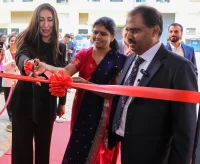Having a child suffering from cancer is a devastating experience for the parents, siblings and the youngster. Childhood cancer care in third world country is greatly underserved mainly due to inadequate healthcare budget, scarce diagnostic facilities and paucity of appropriately trained personnel.
According to study by Dr Festus Njuguna, a consultant paediatric oncologist at Moi Teaching and Referral Hospital (MTRH) in Eldoret, the survival rate of children with cancer is 10-20 per cent with parents having little information regarding the effects of childhood cancer treatment.
“More than 80 percent of the children with cancer die without access to adequate treatment. Families do not fully understand their child’s illness and the need to adhere with cancer treatment,” he said.
The study, Adherence with Childhood Cancer Treatment in Kenya points that socio-economic, treatment related and psychological challenges alters the normal lives of the families during the treatment of their children.
At the MTRH, the second largest referral hospital in the country, about 110 new paediatric-oncology patients are seen annually, with 13-15 patients being taken care of in an inpatient unit within the paediatric wards and outpatient clinic that runs once per week.
[ See also: Awareness on children with kidney failure still low ]
Financial situations
About 89 percent of families reported financial difficulties with 83 percent perceiving financial struggles as a great burden during the treatment of a child with cancer. Of these families, 64 percent were driven into debt.
Most families, 63 percent had no regular income with 66 percent reporting a decrease in the earnings since the start of the treatment.
In order to pay the cancer treatment for their children, 76 percent of the parents had to sell family properties like livestock (60percent), land (9 percent) and or other possessions (23 percent).
Families, 47 percent, with a child in cancer treatment received financial support from friends, 41 percent from relatives, 36 percent from community and from grandparents 29 percent.
Due to financial constraints, 29 percent of the families expected not to be able to complete their child cancer treatment with 23 percent of the parents being uncertain about the continuation of the medical care. Treatment cost forced 28 percent of the families to withhold their child from certain aspects of prescribed treatment.
For siblings left at home, 47 percent of the parents experienced difficulties in providing food for them.
[ Read: Milk of kindness: Women to donate breast milk to Pumwani bank ]
Other expenses
Traveling to and from the hospital during therapy sessions was considered to be expensive by 84 percent of the families, with 45 percent citing it to be difficult. The time consumed during the child treatment was reported to be high by 77 percent of the parents.
The reasons families reported that hinder them from attending appointments in the hospital were: travel costs (52 percent), inadequate transport facilities (20 percent) and distance from clinic (20 percent).
NHIF cancer care plan
Early this year, the National Hospital Insurance Funds (NHIF) announced plans to restructure the oncology care with cancer care plan that will pay for the entire cancer treatment and care to its clients.
The proposal awaiting approval from the Ministry of Health (MoH) will ensure NHIF increases the number of cycles covered in therapy sessions.
Presently, the insurer covers 20 radiotherapy sessions at Sh3,600 each with some patient prescribed for up to 36 sessions. Therefore, the extra sessions have to be paid by the patients by their own means or abandon the treatment.
The primary chemotherapy is limited at Sh25,000 per session, but the stage and type of the cancer can be priced to Sh150,000 per session.
In the last financial year 2017/18, NHIF spent Sh1.36 billion towards cancer treatment payment, an 11 percent increase from the previous Sh1.23 billion in 2017/16.
Cancer remains to be the most expensive disease to treat in the country with the oncology care saving families millions of shillings in hospital bills both in Kenya and abroad.
“Despite financial difficulties, only third of Kenyan parents expected not to be able to complete cancer treatment. Potential solutions to financial problems includes lobbying for more government and donor funding which can help cover some of the expenses the parents incur,” noted Dr Njuguna.
[ See also: Why Kenya’s health sector is on it’s sickbed ]
“They can also provide financial support to parents or having houses near the hospitals where families could stay in between treatment courses since transport to hospital came out as expensive, time consuming and difficult,” he added.
Kenyan families suffer a lot of economic turmoil when they have children undergoing cancer treatment, also the level of knowledge and understanding of childhood cancer in the community is quite low.
Stigma against cancer is still common in communities resulting to parents hiding the diagnosis of their child’s health or seeking complementary alternative medicine such as spiritual healers and traditional herbalists.
Childhood cancer survival can therefore be improved if the government could reduce the economic burden from the parents and increase awareness on the disease at grass-root levels.













Leave a comment